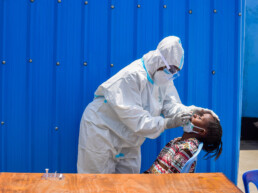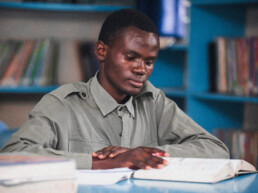The Challenge
Africa is home to 250 million people living in informal settlements, a number expected to rise by 125 million by 2030. With 77% of Africa’s population comprising youth – and 39% of young people in Kenya unemployed – informal settlements face compounded challenges. These communities are systemically excluded from decision-making processes that directly affect their lives, leaving them with limited agency and an inability to advocate for change.
Furthermore, a lack of cohesion and collective voice hinders their ability to address shared challenges such as unemployment, sexual and gender-based violence (SGBV), restricted access to education and quality healthcare, and inadequate infrastructure. These persistent issues perpetuate cycles of vulnerability and unfulfilled potential—barriers which the SHOFCO Urban Network (SUN) seeks to solve.
The Solution
Organizing for Change
Through SHOFCO Urban Network (SUN), we promote cohesion in the community through peace-building efforts, youth forums, and other community-driven initiatives. We train local leaders to help them identify and address issues in their community, including policy reform. We enhance inclusion by recruiting a diverse group of members and leaders, such as people with disabilities, refugees, and women. Together, these leaders partner with local governments to address structural barriers to youth’s access to jobs, financial services, communication, and voting. They also lobby county and national governments to prioritize youths, including policy drafting and fund allocation. Furthermore, we develop financial products for the community and gather data to build evidence for grassroots-led work.
We organize marginalized communities through a network of elected representatives, zone leaders, and an executive committee. This tiered structure ensures smooth communication, effective dispute resolution, and streamlined project management while fostering collaboration across regions.
Micro-Level Initiatives
Through SUN, community groups facilitate peer-to-peer savings networks to mitigate the risks of unexpected death that can devastate family economics. SUN also connects members to essential services, including SHOFCO’s health clinics, clean water kiosks, and vocational and employability training.
Macro-Level Advocacy
SUN mobilizes large-scale advocacy campaigns, ensuring residents can influence policies and hold governments accountable. By integrating advocacy with access to SHOFCO’s essential services, SUN strengthens community resilience and promotes civic engagement.
The Outcomes
The impact of SUN is measured through a series of behavior change indicators, reflecting short-term, medium-term, and long-term progress.
Short-Term
Individuals and households:
- Attend public participation policy events.
- Engage meaningfully and peacefully with government policies.
- Draft petitions and policy memoranda to their local governments.
- Display improved capacity to engage on policy topics (negotiation skills, leading group discussions.)
- Access jobs, financial services, communication, and voting in spite of structural barriers.
- Take early steps to build collective voice and impact, such as forming CBOs.
Governments and decision-makers:
- Seek out participation and input from youth when drafting policies.
- Address pressing topics for residents of urban informal settlements in new policies.
- Allocate funds for youth needs.
- Enact inclusive policy frameworks.
Medium-Term
Individuals and households:
- Reach leadership positions in politics, civil society, and private sector.
- Trust the government, civil society, and private sector.
- Apply to receive government-allocated funds.
Governments and decision-makers:
- Eliminate structural barriers for access to jobs, financial services, communication, and voting.
- Consistently include youth in policy decision-making.
- Dedicate funds to meet the needs of youth.
Long-Term
- Peaceful co-existence and reduced incidences of violence in informal settlements.
- Increased opportunities for all people in informal settlements to reach their full potential.
- Increased and equitable political representation of people in informal settlements.
- Government sees youth as active, meaningful participants in society.
- Improved government accountability.
- Young people experience increased economic growth and social change, and believe in their. ability to enact change to address their community’s needs, collaborating with the relevant. stakeholders along the way.
- Hope and a sense of promise for the future.
Ultimately, through SUN, we are building a self-sustaining community advocacy movement that continues to expand its membership and amplify its collective voice.
The Impact
2m
SUN beneficiaries
84
active SUN sites in Kenya
70%
of SUN members are youth


